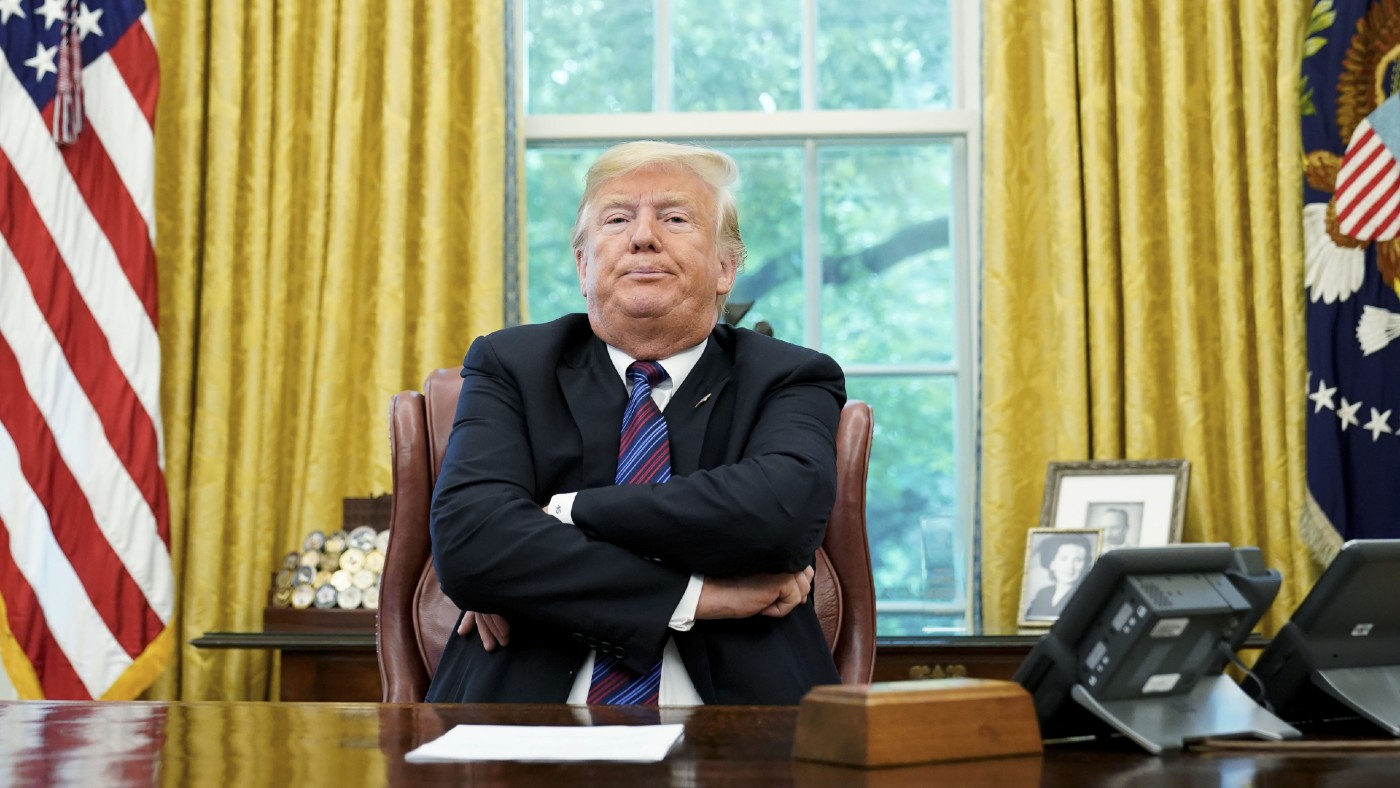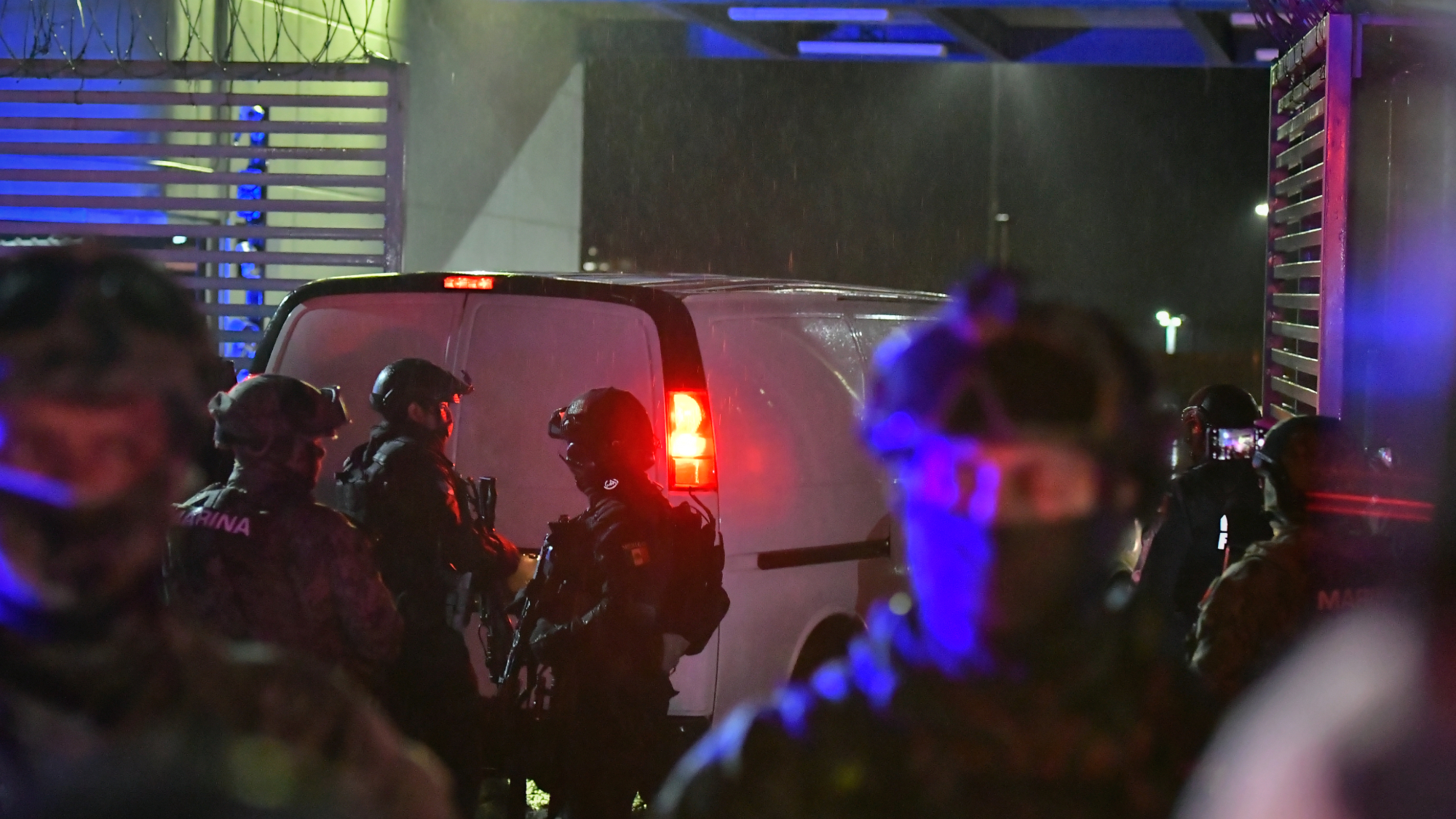‘Fumigate him out’: what happens if Donald Trump refuses to accept defeat?
The US president has failed to give a straight answer about whether he will accept result of upcoming election

A free daily email with the biggest news stories of the day – and the best features from TheWeek.com
You are now subscribed
Your newsletter sign-up was successful
Donald Trump will be “fumigated out” of the Oval Office if he refuses to quit following his predicted defeat in November’s US presidential election, according to the top US Democrat.
House Speaker Nancy Pelosi issued the warning after the president failed to give a straight answer during a TV interview about whether he “might not accept” the results of the vote.
Speaking to Fox News on Sunday, Trump replied: “No. I have to see. Look you - I have to see. No, I'm not going to just say ‘yes’. I'm not going to say ‘no’. And I didn’t last time, either.”
The Week
Escape your echo chamber. Get the facts behind the news, plus analysis from multiple perspectives.

Sign up for The Week's Free Newsletters
From our morning news briefing to a weekly Good News Newsletter, get the best of The Week delivered directly to your inbox.
From our morning news briefing to a weekly Good News Newsletter, get the best of The Week delivered directly to your inbox.
What are the rules?
Depending on the result of the upcoming presidential election, at noon on 20 January 2021 one of two things will happen. Either the clock will reset for another four years of Trump’s presidency or a new leader - expected to be presumptive Democratic presidential nominee Joe Biden - will be inaugurated.
The date represents “democracy’s most dangerous instant: the interval when power changes hands, testing whether the nation stays moored to self-governance”, says The Atlantic.
The idea of Trump attempting to cling to power may “seem far-fetched”, Politico adds. “But the president’s comments have people chattering in the halls of Congress and throughout the Beltway.”
A free daily email with the biggest news stories of the day – and the best features from TheWeek.com
Constitutional law expert Jonathan Turley told the news site that a president who fails to leave the White House after their replacement is sworn in is little more than “an interloper”.
“The system would make fast work on any president who attempted to deny the results of the election,” the George Washington University professor said.
On the other hand, a president could challenge the legitimacy of a narrow Democratic win - which is why Pelosi says her party’s winning margin must be a “big” one.
What if the president loses but still won’t leave?
Noon on 20 January would also mark the expiry of the nuclear codes, which allow Trump to launch an atomic weapon, Slate explains.
The officer who has been following the president around with the so-called “football” that contains the nuclear codes leaves his side. And simultaneously, another officer holding a backup football joins Biden at the inauguration ceremony.
The football represents the transition of military power from one president to the next, and “the entire US military establishment will pivot away from ex-president Trump and salute President Biden”, says Slate.
“The principle of civilian control is hammered into American officers from the time they’re cadets - and the 20th Amendment of the Constitution states, ‘The terms of the President and Vice President shall end at noon on the 20th day of January’ - no ifs, ands, or buts.”
If Trump attempted to order the military to do anything for him at that point, they would be obliged to refuse. Failure to do so would result in each rebel personnel member’s conviction for mutiny and sedition.
As the football changes hands, the Secret Service also abandons the former president, with the exception of a small group of officers who follow him and his family for the rest of their lives. And foreign powers open lines of communication with the Biden administration, and sever those connected to Trump.
If Trump managed to enlist any military defectors to his cause, the majority of the US Army would be obliged to answer to Commander-in-Chief Biden. “In other words,” says Slate, “Trump could hole himself up in the Oval Office, but the Oval Office would very soon be cut off from all power. He would have no choice but to give up.”
What else has fuelled concerns about whether he will go?
Trump has already suggested that mail-in voting represents a plot to steal the election. He has also made the apparently tongue-in-cheek suggestion that, by popular demand, he might stay in office beyond the Constitution’s eight-year limit.
Prior to his 2016 presidential election win, Trump “made similar comments about not accepting defeat”, the London Evening Standard notes.
However, the Biden camp has indicated that it is not overly worried about Trump not leaving. Democrat spokesperson Andrew Bates yesterday insisted that “the American people will decide this election”.
“And the United States government is perfectly capable of escorting trespassers out of the White House,” he added.
Could the system fail?
If the election yields a narrow victory to Biden but Trump contests the result, the vote could go to a recount.
According to The Atlantic, in such a situation the president “could put the military and other tools of presidential power in an awkward spot, pressuring them to pick sides and untangle competing claims about who won”.
Lawrence Douglas, a law professor at Massachusetts’ Amherst College, published a book this year titled Will He Go? that lays out what could happen if both men claim to have won the election and neither back down, as happened in 2000 before Al Gore conceded to George W. Bush.
“In 2020, we have no Al Gore to save us from a complete electoral meltdown and the unrest and violence it could unleash,” Douglas wrote.
The law expert told The Atlantic: “If people really prepare to engage in constitutional brinkmanship, the system isn’t particularly designed to deal with that type of person… It depends on people having internalised the norms that make a constitutional democracy work.”
Democrat congressman Adam Smith, chair of the House Armed Services Committee, agrees with that assessment.
“There’s a zero percent chance that [Trump] would gracefully transfer power,” Smith said. “The best we can hope for is that he would ungracefully transfer power.”
Arion McNicoll is a freelance writer at The Week Digital and was previously the UK website’s editor. He has also held senior editorial roles at CNN, The Times and The Sunday Times. Along with his writing work, he co-hosts “Today in History with The Retrospectors”, Rethink Audio’s flagship daily podcast, and is a regular panellist (and occasional stand-in host) on “The Week Unwrapped”. He is also a judge for The Publisher Podcast Awards.
-
 Film reviews: ‘Wuthering Heights,’ ‘Good Luck, Have Fun, Don’t Die,’ and ‘Sirat’
Film reviews: ‘Wuthering Heights,’ ‘Good Luck, Have Fun, Don’t Die,’ and ‘Sirat’Feature An inconvenient love torments a would-be couple, a gonzo time traveler seeks to save humanity from AI, and a father’s desperate search goes deeply sideways
-
 Political cartoons for February 16
Political cartoons for February 16Cartoons Monday’s political cartoons include President's Day, a valentine from the Epstein files, and more
-
 Regent Hong Kong: a tranquil haven with a prime waterfront spot
Regent Hong Kong: a tranquil haven with a prime waterfront spotThe Week Recommends The trendy hotel recently underwent an extensive two-year revamp
-
 Maxwell pleads 5th, offers Epstein answers for pardon
Maxwell pleads 5th, offers Epstein answers for pardonSpeed Read She offered to talk only if she first received a pardon from President Donald Trump
-
 Death in Minneapolis: a shooting dividing the US
Death in Minneapolis: a shooting dividing the USIn the Spotlight Federal response to Renee Good’s shooting suggest priority is ‘vilifying Trump’s perceived enemies rather than informing the public’
-
 Trump pardons crypto titan who enriched family
Trump pardons crypto titan who enriched familySpeed Read Binance founder Changpeng Zhao pleaded guilty in 2023 to enabling money laundering while CEO of the cryptocurrency exchange
-
 The trial of Jair Bolsonaro, the 'Trump of the tropics'
The trial of Jair Bolsonaro, the 'Trump of the tropics'The Explainer Brazil's former president will likely be found guilty of attempting military coup, despite US pressure and Trump allegiance
-
 Trump lambasts crime, but his administration is cutting gun violence prevention
Trump lambasts crime, but his administration is cutting gun violence preventionThe Explainer The DOJ has canceled at least $500 million in public safety grants
-
 Alcatraz: America's most infamous prison
Alcatraz: America's most infamous prisonThe Explainer Donald Trump wants to re-open notorious 'escape-proof' jail for 'most ruthless and violent prisoners' in the US
-
 Mexico extradites 29 cartel figures amid US tariff threat
Mexico extradites 29 cartel figures amid US tariff threatSpeed Read The extradited suspects include Rafael Caro Quintero, long sought after killing a US narcotics agent
-
 Leonard Peltier released from prison
Leonard Peltier released from prisonSpeed Read The Native American activist convicted of killing two FBI agents had his life sentence commuted by former President Joe Biden